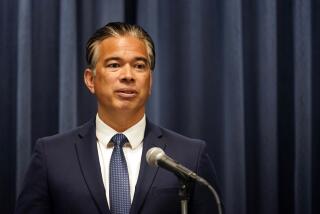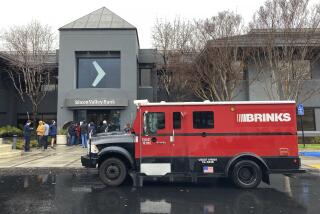Court Reinstates Lawsuit Against Thrift’s Lawyers : S&Ls;: The FDIC is seeking damages of $20 million from O’Melveny & Myers for alleged malpractice.
- Share via
A federal appellate court in Los Angeles reinstated a malpractice lawsuit Monday against California’s fifth-largest law firm for its work on two real estate syndications for now-defunct American Diversified Savings Bank in Costa Mesa.
The U.S. 9th Circuit Court of Appeals reversed a lower court’s pretrial dismissal of a suit brought against O’Melveny & Myers by the Federal Deposit Insurance Corp., acting as receiver for the savings and loan.
The higher court found that O’Melveny owed a duty to protect the S&L; from liability by avoiding possible false or misleading statements in two private placement memorandums that the law firm issued near the end of 1985. O’Melveny & Myers is based in Los Angeles, but the work was done from its Newport Beach office.
The securities documents were designed to induce investors to join in two American Diversified real estate syndications, which were limited partnerships that held and developed a number of properties.
The syndications were closed, or fully subscribed, only weeks before the thrift failed in February, 1986. The FDIC accused the law firm of failing to perform even routine investigation into the thrift’s financial health before issuing the memorandums.
“We’re very gratified,” said John Thomas, associate general counsel of the FDIC. “Now we’ll go back to the lower court and either try the case or settle it.”
The agency is seeking nearly $20 million in damages for losses on real estate put into the syndications and for costs stemming from its decision to rescind the deals and repay investors in full.
But James W. Colbert, an O’Melveny partner, disputed both the firm’s liability and the amount of damages. He pointed out that the law firm represented the S&L;’s syndication subsidiary and that it never had cause to investigate the S&L;’s financial health.
The properties put into the syndications when they closed, he said, are believed to be properties that the thrift or its subsidiary already owned, so any losses on real estate would have been thrift losses anyway. Out-of-pocket expenses for commissions and related costs were less than $1 million, he said.
“My gut reaction is that I’m disappointed with the 9th Circuit opinion,” Colbert said. “Whether we would seek further review or go back to the trial court, I’m not prepared to say yet.”
Theodore A. Russell, a San Francisco lawyer representing the FDIC, said the lawsuit is the last piece of professional liability litigation relating to the collapse of the complex operation headed by one-time Indian air force jet pilot Ranbir Sahni and Lester Day.
Lawsuits with Sahni, Day and other insiders were settled in 1990 mostly as part of a three-way deal that also settled federal claims against the owner and operators of failed Consolidated Savings Bank in Irvine. Consolidated owner Robert A. Ferrante of Newport Beach and others are currently on trial in federal court in Los Angeles on criminal charges of misapplying the thrift’s funds.
In the annals of thrift failures, American Diversified was the institution that led to the highest ever federal refund--$1.14 billion--to depositors.
More to Read
Inside the business of entertainment
The Wide Shot brings you news, analysis and insights on everything from streaming wars to production — and what it all means for the future.
You may occasionally receive promotional content from the Los Angeles Times.










